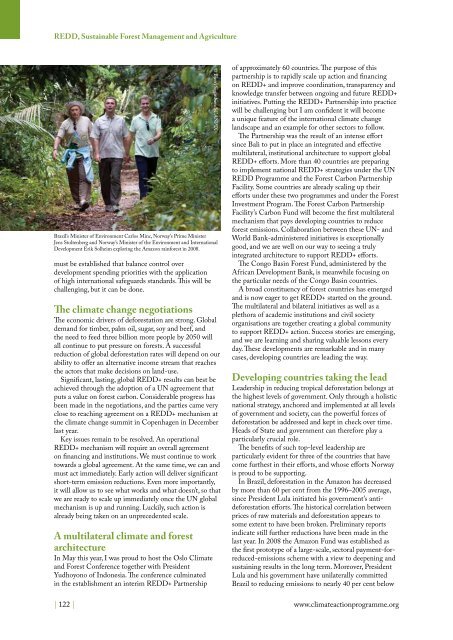Climate Action 2010-2011
Create successful ePaper yourself
Turn your PDF publications into a flip-book with our unique Google optimized e-Paper software.
Redd, Sustainable Forest Management and Agriculture<br />
Brazil’s Minister of Environment Carlos Minc, Norway’s Prime Minister<br />
Jens Stoltenberg and Norway’s Minister of the Environment and International<br />
Development Erik Solheim exploring the Amazon rainforest in 2008.<br />
must be established that balance control over<br />
development spending priorities with the application<br />
of high international safeguards standards. This will be<br />
challenging, but it can be done.<br />
The climate change negotiations<br />
The economic drivers of deforestation are strong. Global<br />
demand for timber, palm oil, sugar, soy and beef, and<br />
the need to feed three billion more people by 2050 will<br />
all continue to put pressure on forests. A successful<br />
reduction of global deforestation rates will depend on our<br />
ability to offer an alternative income stream that reaches<br />
the actors that make decisions on land-use.<br />
Significant, lasting, global REDD+ results can best be<br />
achieved through the adoption of a UN agreement that<br />
puts a value on forest carbon. Considerable progress has<br />
been made in the negotiations, and the parties came very<br />
close to reaching agreement on a REDD+ mechanism at<br />
the climate change summit in Copenhagen in December<br />
last year.<br />
Key issues remain to be resolved. An operational<br />
REDD+ mechanism will require an overall agreement<br />
on financing and institutions. We must continue to work<br />
towards a global agreement. At the same time, we can and<br />
must act immediately. Early action will deliver significant<br />
short-term emission reductions. Even more importantly,<br />
it will allow us to see what works and what doesn’t, so that<br />
we are ready to scale up immediately once the UN global<br />
mechanism is up and running. Luckily, such action is<br />
already being taken on an unprecedented scale.<br />
A multilateral climate and forest<br />
architecture<br />
In May this year, I was proud to host the Oslo <strong>Climate</strong><br />
and Forest Conference together with President<br />
Yudhoyono of Indonesia. The conference culminated<br />
in the establishment an interim REDD+ Partnership<br />
| 122 |<br />
© Bjørn Sigurdsøn/SCANPIX<br />
of approximately 60 countries. The purpose of this<br />
partnership is to rapidly scale up action and financing<br />
on REDD+ and improve coordination, transparency and<br />
knowledge transfer between ongoing and future REDD+<br />
initiatives. Putting the REDD+ Partnership into practice<br />
will be challenging but I am confident it will become<br />
a unique feature of the international climate change<br />
landscape and an example for other sectors to follow.<br />
The Partnership was the result of an intense effort<br />
since Bali to put in place an integrated and effective<br />
multilateral, institutional architecture to support global<br />
REDD+ efforts. More than 40 countries are preparing<br />
to implement national REDD+ strategies under the UN<br />
REDD Programme and the Forest Carbon Partnership<br />
Facility. Some countries are already scaling up their<br />
efforts under these two programmes and under the Forest<br />
Investment Program. The Forest Carbon Partnership<br />
Facility’s Carbon Fund will become the first multilateral<br />
mechanism that pays developing countries to reduce<br />
forest emissions. Collaboration between these UN- and<br />
World Bank-administered initiatives is exceptionally<br />
good, and we are well on our way to seeing a truly<br />
integrated architecture to support REDD+ efforts.<br />
The Congo Basin Forest Fund, administered by the<br />
African Development Bank, is meanwhile focusing on<br />
the particular needs of the Congo Basin countries.<br />
A broad constituency of forest countries has emerged<br />
and is now eager to get REDD+ started on the ground.<br />
The multilateral and bilateral initiatives as well as a<br />
plethora of academic institutions and civil society<br />
organisations are together creating a global community<br />
to support REDD+ action. Success stories are emerging,<br />
and we are learning and sharing valuable lessons every<br />
day. These developments are remarkable and in many<br />
cases, developing countries are leading the way.<br />
developing countries taking the lead<br />
Leadership in reducing tropical deforestation belongs at<br />
the highest levels of government. Only through a holistic<br />
national strategy, anchored and implemented at all levels<br />
of government and society, can the powerful forces of<br />
deforestation be addressed and kept in check over time.<br />
Heads of State and government can therefore play a<br />
particularly crucial role.<br />
The benefits of such top-level leadership are<br />
particularly evident for three of the countries that have<br />
come furthest in their efforts, and whose efforts Norway<br />
is proud to be supporting.<br />
In Brazil, deforestation in the Amazon has decreased<br />
by more than 60 per cent from the 1996–2005 average,<br />
since President Lula initiated his government’s antideforestation<br />
efforts. The historical correlation between<br />
prices of raw materials and deforestation appears to<br />
some extent to have been broken. Preliminary reports<br />
indicate still further reductions have been made in the<br />
last year. In 2008 the Amazon Fund was established as<br />
the first prototype of a large-scale, sectoral payment-forreduced-emissions<br />
scheme with a view to deepening and<br />
sustaining results in the long term. Moreover, President<br />
Lula and his government have unilaterally committed<br />
Brazil to reducing emissions to nearly 40 per cent below<br />
www.climateactionprogramme.org












